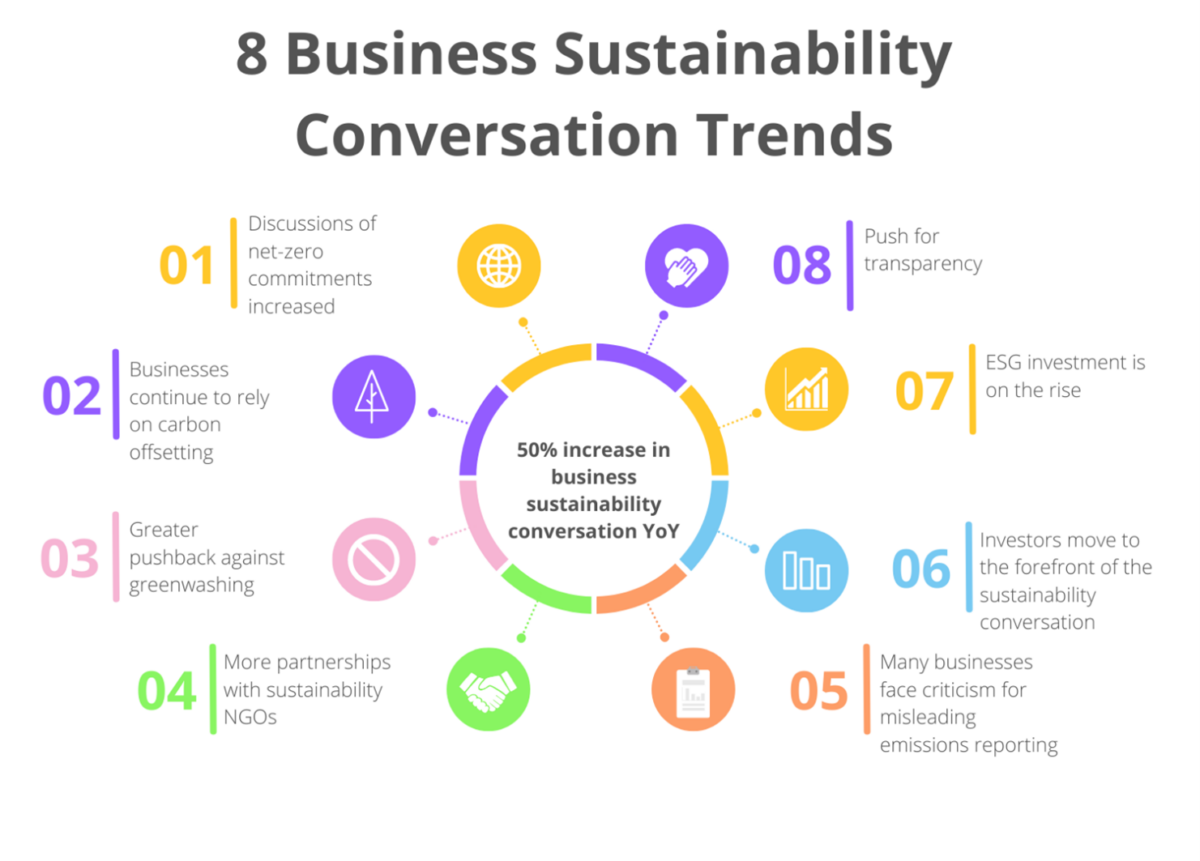As the business world becomes more aware of its environmental impact, companies are feeling increasing pressure to become more sustainable. Firms that embrace sustainability trends in business can be rewarded with improved customer loyalty and public perception on top of long-term cost savings.
This blog post will look at four key sustainability trends in business that companies should consider incorporating into their operations:
- Sustainable Manufacturing.
- Waste Reduction.
- Sustainable Supply Chain Management.
- Corporate Social Responsibility (CSR) Programs.
All these initiatives can help reduce a company’s carbon footprint while providing many other benefits too!
Table of Contents
Sustainable Manufacturing
Sustainable manufacturing is the practice of creating products with minimal environmental impact. It involves using recycled materials, lean manufacturing practices, and automation and robotics to reduce waste and conserve resources.
Recycled Materials
The use of recycled materials in the production process can help businesses reduce their carbon footprint by reducing emissions from resource extraction. For example, a company that produces furniture could source wood from sustainably managed forests or use reclaimed wood instead of newly harvested lumber. This helps preserve natural habitats while still providing quality products for customers.
Lean Manufacturing Practices
Lean manufacturing is an approach that focuses on eliminating waste throughout the production process. By streamlining processes such as inventory management, scheduling, and transportation logistics, companies can save money while also reducing their environmental impact.
Additionally, implementing just-in-time delivery systems reduces the amount of time spent waiting for parts or supplies which further cuts down on energy consumption and emissions associated with transportation costs.
Automation and Robotics
Automation and robotics are increasingly being used in sustainable manufacturing operations to increase efficiency while minimizing human labor needs, reducing both cost and energy usage associated with traditional methods of production.
Automated machines often have lower operating costs and fewer safety risks especially if hazardous materials are involved in the process.
Additionally, robots can work 24/7 without breaks which significantly increases productivity levels compared to manual labor.
 (Source)
(Source)
Waste Reduction Strategies
Waste reduction strategies are becoming increasingly important for businesses to adopt in order to reduce their environmental impact.
Recycling programs are a great way for companies to start reducing the amount of waste they produce. By implementing reuse programs such as refilling containers or donating used items, businesses can help keep usable materials out of landfills and reduce the need for new products. Additionally, recycling programs allow companies to repurpose old materials into new products instead of throwing them away.
Composting and upcycling initiatives are also effective ways for businesses to minimize their waste output while still creating useful products from existing resources. Composting involves breaking down organic material into nutrient-rich soil that can be used in gardens or other landscaping projects. Upcycling is the process of taking discarded items and transforming them into something more valuable than before — such as turning old furniture pieces into decorative art or sewing fabric scraps into purses or wallets.
Finally, zero waste goals provide an even more ambitious target for companies looking to reduce their environmental footprint. These goals aim towards producing no landfill waste at all through creative solutions such as compostable packaging materials, reusable shipping containers, and innovative product designs.
Sustainable Supply Chain Management
Sustainable Supply Chain Management is an important part of a business’s sustainability strategy. It involves the careful selection and management of suppliers, producers, and other stakeholders in order to reduce environmental impacts while still meeting customer demands.
Responsible Sourcing Practices
Responsible sourcing practices involve assessing potential suppliers for their ability to meet ethical standards. This includes looking at labor conditions, materials used, and waste management processes. Companies should also look into how they can improve their own supply chain by reducing emissions or increasing recycling rates.
Local Suppliers and Producers
Local suppliers and producers are often more sustainable than those located further away due to reduced transportation costs.
Additionally, local businesses are able to provide fresher ingredients or materials which have not been subjected to additional processing steps such as freezing or drying.
Supporting local businesses helps create jobs in the community while also reducing carbon emissions from transport activities associated with global trade networks.
Fair Trade Certification
Look for suppliers that pay their workers right and provide them with safe working conditions. Furthermore, companies in your supply chain must adhere to strict environmental standards when it comes to water conservation and hazardous waste disposal.
Consumers who purchase certified Fair Trade products help support these initiatives directly through increased demand, thus encouraging more companies to adopt similar principles when managing their own supply chains.
Corporate Social Responsibility (CSR) Programs
Corporate Social Responsibility (CSR) programs are an important part of a company’s sustainability efforts. These programs focus on the social and environmental impacts of businesses, as well as their economic performance. Companies that engage in CSR activities demonstrate their commitment to responsible business practices and sustainable development.
Community outreach is a great way for companies to show their commitment to CSR. Examples include sponsoring local events or donating to charities that benefit the community. This type of outreach helps build relationships with stakeholders and creates goodwill for the company while also helping those in need.
Employee engagement activities are another form of CSR initiative that creates a positive work environment. Employees can get involved in meaningful projects outside of work hours such as volunteering at a food bank, participating in beach clean-ups, or helping out at animal shelters. This type of engagement not only boosts morale but also shows employees that they are valued members of the team who can have an impact beyond just their job duties.
FAQs About Sustainability Trends in Business
What are the trends in sustainability?
- Becoming carbon neutral.
- Sustainable food.
- Greenwashing.
What are the 4 types of sustainability?
- Human sustainability.
- Social sustainability.
- Economic sustainability.
- Environmental sustainability.
What are the 3 principles of business sustainability?
The three pillars of sustainability are the environment, society, and the economy. These three principles are more popularly known as people, planet, and profits.
Conclusion
As businesses continue to strive for sustainability, the trends outlined above will become increasingly important.
Conclusions
Eco-products, sustainable manufacturing, and net-zero emissions are key trends that businesses should be aware of in 2023. Companies must understand the risks and opportunities associated with these trends in order to remain competitive.
By implementing these sustainability trends in business operations, companies can benefit from increased efficiency while helping protect the environment at the same time.
It is time for businesses to take action and make changes that will create long-term positive impacts on our planet. Let’s start taking steps today toward making sustainable business practices commonplace!
{“@context”:”https:\/\/schema.org”,”@type”:”FAQPage”,”mainEntity”:[{“@type”:”Question”,”name”:”What are the trends in sustainability?”,”acceptedAnswer”:{“@type”:”Answer”,”text”:”
- \n\t
- Becoming carbon neutral.\n\t
- Sustainable food.\n\t
- Greenwashing.\n
- Becoming carbon neutral.
- Sustainable food.
- Greenwashing. “}},{“@type”:”Question”,”name”:”What are the 4 types of sustainability?”,”acceptedAnswer”:{“@type”:”Answer”,”text”:”
- \n\t
- Human sustainability.\n\t
- Social sustainability.\n\t
- Economic sustainability.\n\t
- Environmental sustainability.\n
- Human sustainability.
- Social sustainability.
- Economic sustainability.
- Environmental sustainability. “}},{“@type”:”Question”,”name”:”What are the 3 principles of business sustainability?”,”acceptedAnswer”:{“@type”:”Answer”,”text”:”
The three pillars of sustainability are the environment, society, and the economy.\u00a0These three principles are more popularly known as people, planet, and profits. “}}]}





